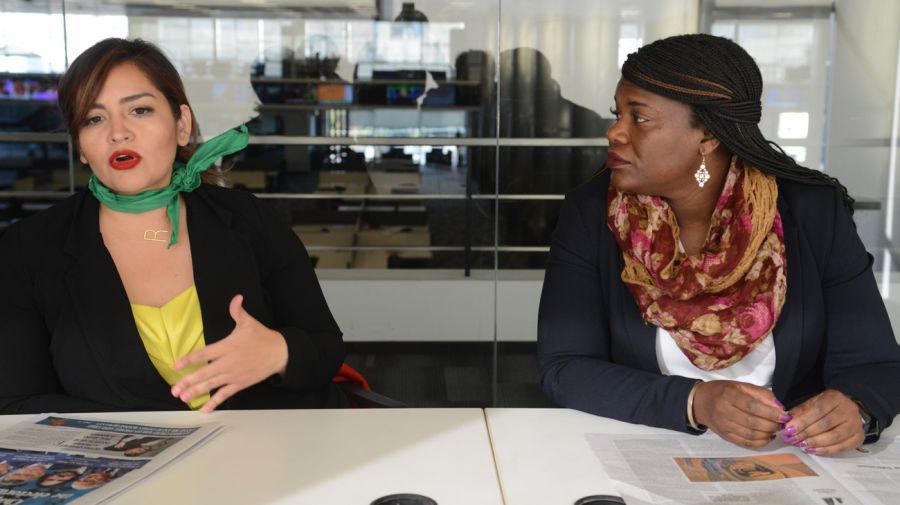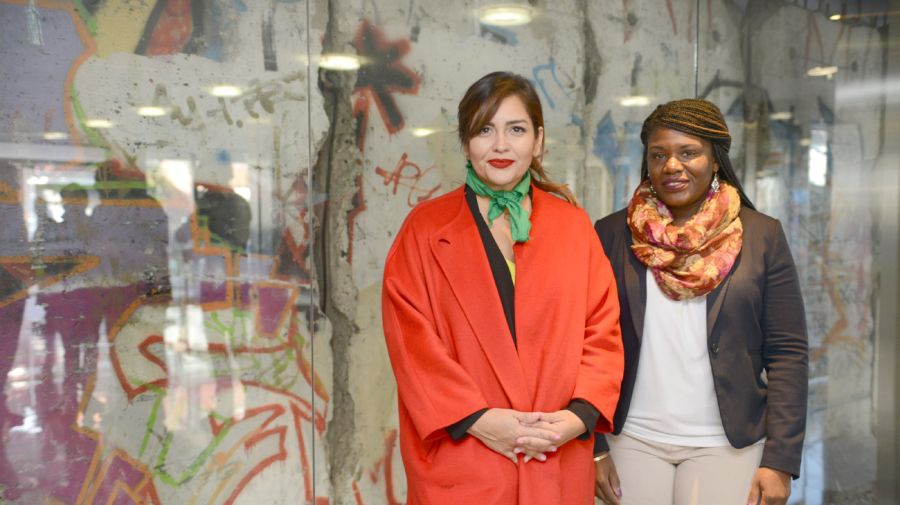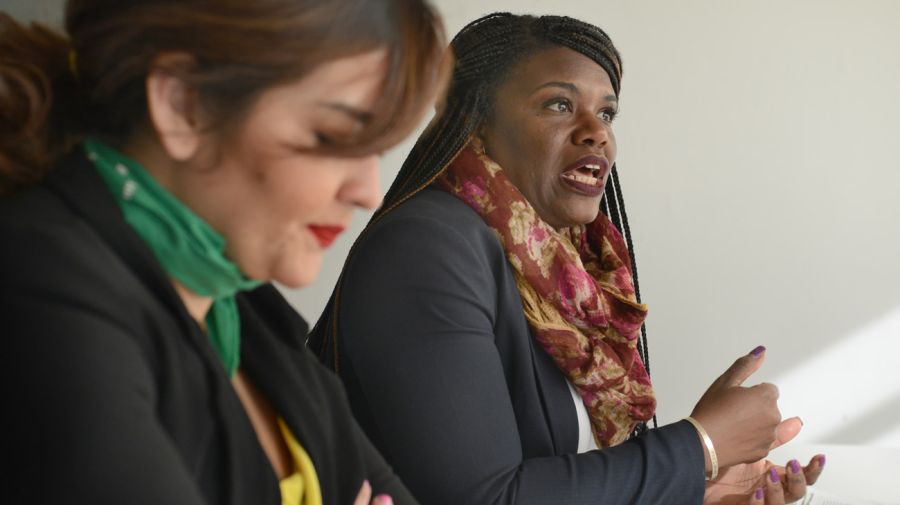In US politics, change is afoot. With a Republican Party now at ease with a racist pathological liar in the Oval Office and the Democrats left dazed and confused by Donald Trump, eyes are turning toward the 2020 election, which creeps slowly but surely closer by the day.
The Democratic leadership, no doubt, will have the US president’s removal as their prime objective come next November. But as they plan for the ex-reality TV star's final defeat, they’d do well not to drop the ball – for an insurgent group of grassroots activists are drawing up plans for a full-out assault on established candidates.
The activists are diverse and unique, but they are united by a core group of ideals – healthcare for all, a living wage, improved education, no corporate money in politics etc. Pushed by two political action committees (PACs) – Justice Democrats and Brand New Congress – the insurgents are increasingly rising to greater prominence, thanks in part to Alexandria Ocasio-Cortez, the groups’ biggest success story, who famously won a seat in the House of Representatives last year. Also aiding the cause too was the 2018 Netflix documentary Knock Down The House, which detailed the struggles faced by four upstarts, including Ocasio-Cortez, as they took on established politicians.
Cori Bush and Roza Calderón are two such candidates who tried to take on the status quo last time out. Though both lost their respective races in 2018 (Bush, the Democratic primary for US House, Missouri District 1, as shown in Knock Down The House; Calderón, Primary for US House, California District 4), politics began much earlier for them, through activism on the streets.
Brought to Argentina by FEDUN (Federation of University Teachers) for a series of meetings with political leaders and human rights figures, events and talks, the duo found time to share their experiences with the Times in a joint interview, during which they stressed the importance of connecting with local communities.
Bush, 43, has two kids. She is a pastor, nurse and campaigner. Next year, she will run for office again, challenging an opponent who has held his seat now for 18 years. Inspired to deliver change by the death of Michael Brown, the 18-year-old slain by a police officer in Ferguson, Missouri, in 2014, Bush says she is running to “save lives,” including those of her own children.
Calderón, 34, also says she got into politics for her daughter, 14-year-old Chitra. Born in El Salvador and brought to the United States by her mother, as her homeland was gripped in civil war, Roza is more cautious about her future plans. But she says she will be at the front-line of politics, come what may. “If there is a message that needs to be heard, I’m going to be there to amplify it,” she told the Times.
Both working mothers who dedicate almost all their spare time to activism, the duo are seeking to deliver change for the Democratic Party – and the United States of America.

Tell me a little about your background and how you came to be involved in frontline politics. I know you are are both local activists, but what drove you to want to stand as candidates?
CORI: I grew up under politics. My dad was in politics most of my life. But I didn’t choose to go there. [For me] it was when Michael Brown was murdered. I’m a pastor, I’m a nurse, I work in community health – I went to the street and tried to help. Out there I was radicalised. I was so disappointed that Americans could be treated like terrorists by other Americans. Elected officials are paid US$174,000 a year to represent us and you are not here. You are allowing us to be beat up by police, you are allowing the police to shoot us in our faces with tear gas, you are allowing dogs to chase us, you are allowing us to be shot at.
I was asked to run for office and initially I said ‘No,’ but then I realised that it was the only way to get the heart of the community in those seats – the same heart that had us out there. Because racial equality has to be at the forefront of conversations and I believe we need a fighter in these districts. We don’t need somebody who is complacent, somebody that will just show up to vote. We need somebody that will fight.
ROZA: I was born in El Salvador and after the civil war my mom emigrated to the United States, seeking political asylum. For me, my activism started when I was there visiting my grandfather for the first time and realising how his political views and meanings were the opposite to what my mom had taught us about democracy and women in power. In his house he was the law.
The other situation is playing with kids back then and realising how lucky we were to receive political asylum, to allow us the opportunity to grow up in the United States. It was a complete 180.
From then on, it was the 2000 election where we lost the House, the White House, because we don’t have a popular vote. We have the electoral college. And my teacher at the time, I asked him what can we do and he is like ‘You are 15, 16 and the only thing you can do is protest.’ And I said that is good enough for me.
And then the recession hit right while I was in the middle of my career, so I ended up becoming part of the hustle economy – everything is a hustle, everything is part of the micro jobs, whatever you can do to survive. My marriage ended after the recession, I ended up being a single mom, working my way through school and becoming an advocate for education.
You were both huge outsiders, taking on established candidates. What were the biggest hurdles that you faced. Campaign finance?
ROZA: There’s two things. Campaign finance was the devil beneath it all. Because the Democratic Party in California was so desperate to turn over some of the red seats into blue seats that they actually started recruiting millionaires to finance campaigns because we just didn’t have the funds. So when somebody like myself comes in and says ‘I’m not taking any corporate cash, I’m not taking any lobbyist money, I only want to be people-funded,’ the Democratic Party is looking at me and thinking ‘You are not going to bring money into the party.’ The person that my party decided to endorse is a Republican female who, to the day that she had to register as a Democrat, that’s the last day she was registered as a Republican.
I had an enormous challenge. My district is 90 percent white, Latinos make less than 12 percent of the population, and it’s very Republican. It’s almost like a losing battle. I went in knowing that but I knew that the message that we were carrying was much more important. When Bernie [Sanders] ran in 2016, I still feel like he won. He won the conversation. If you look at the debates today, what we are talking about is his platform. Everybody is jumping on it.
Do you both endorse Bernie [Sanders] at the moment?
CORI: For me, it’s Bernie Sanders. I supported Bernie in 2016, I support him now. He is the same person that he was, he has added to his platform. I don’t have to worry about who he’ll be as a president because he has stayed the same for the last 30 years. What I do worry about is some of these people who are running now. They flip-flop depending on who they are in front of, who is the audience. They flip-flop as soon as they receive a bad letter or a bad tweet.
I care about how you care for the community, what you did before you were involved. That is super important, who were you before you ran for office, who are you when you are home from the Capitol. For me I might work an 8 to 12 hour day as a nurse but when I’m off work, in my free time, what I don’t get paid to do, is my activism.
People are saying that Bernie can’t get black votes. I’m showing you that he has a black woman voter here that is not afraid to speak up. I’m going into as many black communities as I can to let them know why I support him.

You are both with Justice Democrats and Brand New Congress. Why do you their candidates are drawing so much attention – is it because of the rhetoric, or [Netflix documentary] Knock Down the House?
ROZA: I think it has to do with our platform. Unfortunately, the reason why the Democratic Party hates us – even though we are one of them – is that we call out on everyone. With [Democratic candidate for president] Andrew Yang and his message, is as important as Bernie with Medicaid for all.
If there is a message that needs to be heard I’m going to be there to amplify it. It doesn’t matter who the person is.
That’s why I support them. Just to get out there. Bernie hasn’t asked me for his endorsement... but I’m still waiting!
What about [US President Donald] Trump’s rhetoric in that perspective? Is the Democratic Party fighting back hard enough?
ROZA: We are calling everyone out. It doesn’t matter if it’s the sitting president or the sitting speaker in the house. It comes down to two principles. Number one: we are funding you, your campaign and your career. We want results, we want to see a return on our investment. We are not seeing any of that. We go to other countries and we see how our infrastructure is crumbling, in a First World nation, the richest in the world. In California, which is the fifth-largest economy in the world, why is this happening?
We have a failing Congress. We need to get a working Congress in place. And that’s why [Brand New Congress have] endorsed anyone, from Republicans to Independents, as long as they have a progressive view when it comes to populist ideas.
What defines a ‘progressive’ today?
CORI: It’s been made up to be, if you are in support of human rights. I would say supporting the liveable wage, free college, getting the money out of wars, out of politics. All of those things. The difference between Republicans and Democrats now just seems to be blurred. Now we have ‘pro-life Democrats.’ If you are against gay marriage, that means you are Republican.
ROZA: [Immigration] is something I’m passionate about. My experience in the US was tough, even through the legal channels. What I think our government fails to recognise – and just neglects – it’s the struggle of those countries and why they are struggling. If we look at the history of El Salvador and who funded those wars and who actually allowed me to come to the US – against everything that he stood for – is [Ronald] Reagan.
Our Democratic leadership is not strong enough, not bold enough, to speak their minds and they are limited by corporate donors and interests. To me I’m perfectly content to replace every single one of them.
What about the term ‘democratic socialist’? Would either of you call yourself that? Or is that part of the problem?
CORI: I can’t stand the labels. People call me a democratic socialist, a Marxist, a Communist, progressive, liberal. I don’t associate myself with any of them. If that’s what you call me because I want to take care of humanity, call me how you want.
If you label people, then you get to put them in this box.
How have you found Argentina?
CORI: It has been wonderful. I am moved when I hear about free college, free healthcare, both of them in the same place. I came here only knowing what I have read in articles. Now I can put this in perspective and the people have just been amazing. I was surprised though that I don’t see that many people that look like me!
There’s a very strong female activist movement in Argentina. Do you see a similar kind of political awakening among young women in the US?
CORI: Yes. Since Trump [took office], a lot of women that weren’t radicalised before have now taken a stand. There is a movement, young women, older women. With younger women we see organising and them trying to run for political office – local, state and federal. And that’s what it’s going to take.
When you try to go and run for office, you get a lot of pushback. You get the door slammed in your face from your party, which is what we had, and you get the thing that you are a woman. For us, we get the thing, too, that you are a minority woman. They claim we don’t have experience, but you can do it and do it with no name, no title, no money. Just with this movement.
ROZA: Justice Democrats, we grew... our brand, grew faster than we did.
CORI: When the movie [Knock Down The House] came out on Netflix it was a lot of attention. Thousands of messages from all over the world. People asking how can we get this into our country. It’s been crazy.
ROZA: That movie alone has been amazing in inspiring people all over the world to run. I want to inspire people to make change. I want to continue that inspiration to other women. I met with young women here in Argentina and saw how active and passionate they are and that reignites your passion. I see that in the US.

Do you think you could’ve made your runs for office without social media? As normal people?
ROZA: As an activist I had contacts with the media. Once, a reporter from Politico was calling and asking. When I ran for office he ran an article [about the race] and excluded my name. I messaged him and said I would have never imagined that he would exclude me. He responded back and said he was sorry but that, according to Politico, if you don’t have this amount of money then you are not newsworthy.
CORI: One thing that is difficult about being part of Justice Democrats and being part of this movie is that we still work regular jobs. When we travel we have to take time off work and people don’t realise we are regular people.
ROZA: Finding a job after your campaign is a nightmare. People google your name and unfortunately with my name you can find me right away.
Did you fear for your lives during your campaign?
ROZA: I had death threats in my district but in my district we have far-right [wing] people.
CORI: I’ve had to fear for my life since Ferguson. That’s when everything happened. I had several attempts to my life – bullet-holes in my car, my daughter was almost hit by a bullet. We had even, until a month and a half ago, someone trying to run me over a bridge. It has been very real. I have security when I go to certain places. Three months before my primary I was hit by a car and I couldn’t walk for the last three months of my race. I was still willing to do that because I’m trying to save my son’s life. I’m still trying to save the lives of others.
ROZA: We put our lives on the line as activists. When I get death threats, to me it’s just whatever. The one thing that does affect me is the emails. Those you can’t get away from as they come directly to you and some of the messages are so hateful that you wonder what our world has come to.
Some have claimed that Latinos and women of colour are used as props by the main US political parties...
ROZA: We are used as props.
CORI: We are excluded until we are needed.
I noticed that you met with the Justicialist Party and Frente por la Victoria today. Do you see those groups as a natural home for you?
ROZA: When I was growing up and looking around for a female figure in world politics there wasn’t that many. In Latin America, there was one: Evita. My mom was also a huge fan of Che Guevara. And we have always said in our families to do what we can for the people.
That has been our motto. I don’t care what party. I’ve been a Democrat all my life but when I was alongside the Democratic leadership, I didn’t feel like a Democrat any more. I didn’t feel like I fitted in there, I didn’t feel welcome.

























Comments